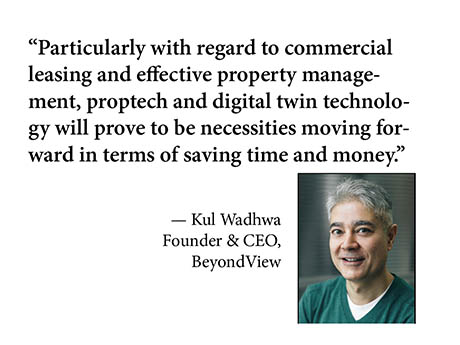By Kul Wadhwa, founder & CEO, BeyondView
It has been widely broadcasted that commercial leasing and office occupancy have struggled since the onset of the COVID-19 pandemic, with headlines including words and phrasing like “zombie,” “apocalypse,” “urban doom loop” and even “epic crash” routinely making the rounds.
As employers, landlords and commercial real estate professionals all grapple with fully remote and hybrid work routines, proptech and its application of artificial intelligence (AI) can prove to be essential tools in accelerating commercial leasing activity and supporting property management.

Kul Wadhwa, BeyondView
Simply put, digital twin technology looks amazing, is cost-effective and saves time. For real estate professionals looking to streamline processes, digital twin technology eliminates the need for multiple service providers, facilitates a streamlined decision-making process and is more visually appealing than other proptech on the market. In dealing with an uncertain economy, deploying new technologies will offer a smart and versatile troubleshooting platform all while allowing for significant savings. And this relatively new digital offering is only going to get better with time.
Real estate’s use of digital twins is the property technology of the future. Digital twins provide an exact digital representation of a physical object and can be developed from various data sources. In applying this technology to real estate, digital twins can be produced from floor plans, blueprints, CAD models, scans and even off-the-shelf digital pictures. In addition, digital twins utilize both AI and machine learning to create the exact virtual version of a space.
Through unbridled innovation, this form of proptech presents a stunning visual experience for its users. From high-definition renderings to white boxing unfinished locations, reimaging spaces and life-like virtual walkthroughs, the next-level visuals provided can be leveraged by brokers, prospective tenants and property managers alike.
Virtually touring the digital representation of a space via a gaming-like experience can accelerate a commercial property’s leasing cycle. For offices or even retail offerings that are not yet complete or ready for occupancy, digital twins allow leasing efforts to proceed in earnest, as prospective tenants need not be creative geniuses to imagine what a space will look like. The digital twin presented will demonstrate the unfinished space’s potential look and feel. Furthermore, compared to traditional offerings such as CAD drawings or rendering services, by utilizing AI, digital twin visuals are produced at a fraction of the time and cost.
In addition to the high-quality imaging produced, the digital representations are easily accessible from desktops or even tablet devices. As the physical limitations of old are lifted, prospective tenants, property managers and leasing agents spread out across multiple locations or even time zones can easily log on to view the virtual spaces and collaborate in real time. Additionally, multiple software downloads are eliminated as select platforms also integrate built-in communication tools that can be opened from web browsers.
For example, a broker or leasing agent based in San Francisco could show multiple commercial properties under construction in Japan to a prospective tenant headquartered in New York City without having to get on a plane. As the prospective tenant may be undecided about the space’s eventual use, by simply clicking a button, the white boxed version is digitally transformed into a retail offering, corporate office or restaurant. This newfound ability to leverage AI and digital twins to digitally reimagine spaces — without added costs — is a game-changing advancement.
Commercial real estate’s digital twin and machine learning applications are not limited to leasing. In fact, the live asset that is produced by AI is a visualization of data that is of paramount importance to property managers and building owners. And this data, which is continuously updated within the digital twin, is then applied to scenario planning and financial analysis, as well as facility and asset management.
Data that is expected to guide the real estate corporate decision-making process is often presented in a manner that is difficult to understand, and previous software solutions may only further complicate matters. By leveraging digital twin technology, data that is easily understood and accessible is stored within a user-friendly hub of information.
This building-specific database offers decision makers real-time access to all relevant information about a building and its inner workings that is both intuitive and contextualized. Property managers can readily retrieve building information and easily reimagine spaces’ potential uses.
With overall market uncertainty looming and office leasing facing a reckoning of sorts, real estate professionals must apply new technologies in order to achieve success. Particularly with regard to commercial leasing and effective property management, proptech and digital twin technology will prove to be necessities moving forward in terms of saving time and money.
Kul Wadhwa is the CEO and Founder of BeyondView, a data-driven technology platform that provides interactive and digital commercial real estate solutions.


